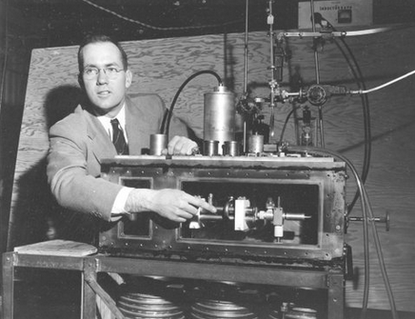Laser inventor Charles Townes is dead at 99


Physicist Charles Townes, who shared the 1964 Nobel Prize in physics for his work inventing the laser and maser, died on Tuesday at age 99. U.C. Berkeley, where Townes had been a professor since 1967, said he had been in poor health and died on the way to the hospital. He had visited campus daily until last year.
Townes was 35 in 1951 when he conceived the idea for the maser (microwave amplification by stimulated emission of radiation), an instrument that concentrated microwaves instead of optical light. He built the first maser in 1954, then developed the idea for the laser (light amplification by the stimulated emission of radiation) four years later with future Nobel laureate Arthur Schawlow, his brother-in-law. Townes later pioneered the use of laser and masers in astronomy.
Along with his Nobel Prize, Towns was awarded the Templeton Prize for Progress Toward Research or Discoveries about Spiritual Realities in 2005 — Mother Teresa is the only other person to win both a Nobel and Templeton prize. He is survived by his wife, Frances Hildreth Townes (whom he married in 1941), four daughters, six grandkids, and two great-grandchildren.
Subscribe to The Week
Escape your echo chamber. Get the facts behind the news, plus analysis from multiple perspectives.

Sign up for The Week's Free Newsletters
From our morning news briefing to a weekly Good News Newsletter, get the best of The Week delivered directly to your inbox.
From our morning news briefing to a weekly Good News Newsletter, get the best of The Week delivered directly to your inbox.
Create an account with the same email registered to your subscription to unlock access.
Sign up for Today's Best Articles in your inbox
A free daily email with the biggest news stories of the day – and the best features from TheWeek.com
Peter has worked as a news and culture writer and editor at The Week since the site's launch in 2008. He covers politics, world affairs, religion and cultural currents. His journalism career began as a copy editor at a financial newswire and has included editorial positions at The New York Times Magazine, Facts on File, and Oregon State University.
-
 Olive oil: alternatives for the 'liquid gold'
Olive oil: alternatives for the 'liquid gold'The Week Recommends As the price of this store cupboard staple has rocketed, we look at ways to save and other oils to use for cooking
By Adrienne Wyper, The Week UK Published
-
 Scotland Yard, Gaza and the politics of policing protests
Scotland Yard, Gaza and the politics of policing protestsTalking Point Met Police accused of 'two-tier policing' by former home secretary as new footage emerges of latest flashpoint
By The Week UK Published
-
 'Cure for Trump amnesia might be his NY trial'
'Cure for Trump amnesia might be his NY trial'Today's Newspapers A roundup of the headlines from the US front pages
By The Week Staff Published
-
 OJ Simpson, star athlete tried for murder, dead at 76
OJ Simpson, star athlete tried for murder, dead at 76Speed Read The former football hero and murder suspect lost his battle with cancer
By Rafi Schwartz, The Week US Published
-
 Momofuku's 'Chili Crunch' trademark uproar
Momofuku's 'Chili Crunch' trademark uproarSpeed Read The company's attempt to own the sole rights has prompted backlash
By Rafi Schwartz, The Week US Published
-
 Kevin Hart awarded Mark Twain Prize
Kevin Hart awarded Mark Twain PrizeSpeed Read He is the 25th recipient of the prestigious comedy prize
By Peter Weber, The Week US Published
-
 Is Downton Abbey set to return for a final film?
Is Downton Abbey set to return for a final film?Speed Read Imelda Staunton reveals that a third movie may be in the pipeline
By Adrienne Wyper, The Week UK Published
-
 'Oppenheimer' sweeps Oscars with 7 wins
'Oppenheimer' sweeps Oscars with 7 winsspeed read The film won best picture, best director (Christopher Nolan) and best actor (Cillian Murphy)
By Peter Weber, The Week US Published
-
 'Rust' armorer convicted of manslaughter
'Rust' armorer convicted of manslaughterspeed read The film's cinematographer Halyna Hutchins was shot and killed by actor Alec Baldwin during rehearsal
By Peter Weber, The Week US Published
-
 The Beatles are getting 4 intersecting biopics
The Beatles are getting 4 intersecting biopicsSpeed Read Director Sam Mendes is making four separate movies, each told from the perspective of one band member
By Peter Weber, The Week US Published
-
 Taylor Swift to Miley Cyrus: female artists dominate 2024 Grammys
Taylor Swift to Miley Cyrus: female artists dominate 2024 GrammysSpeed Read SZA, Phoebe Bridgers and Lainey Wilson were also among the winners at LA gala
By Arion McNicoll, The Week UK Published